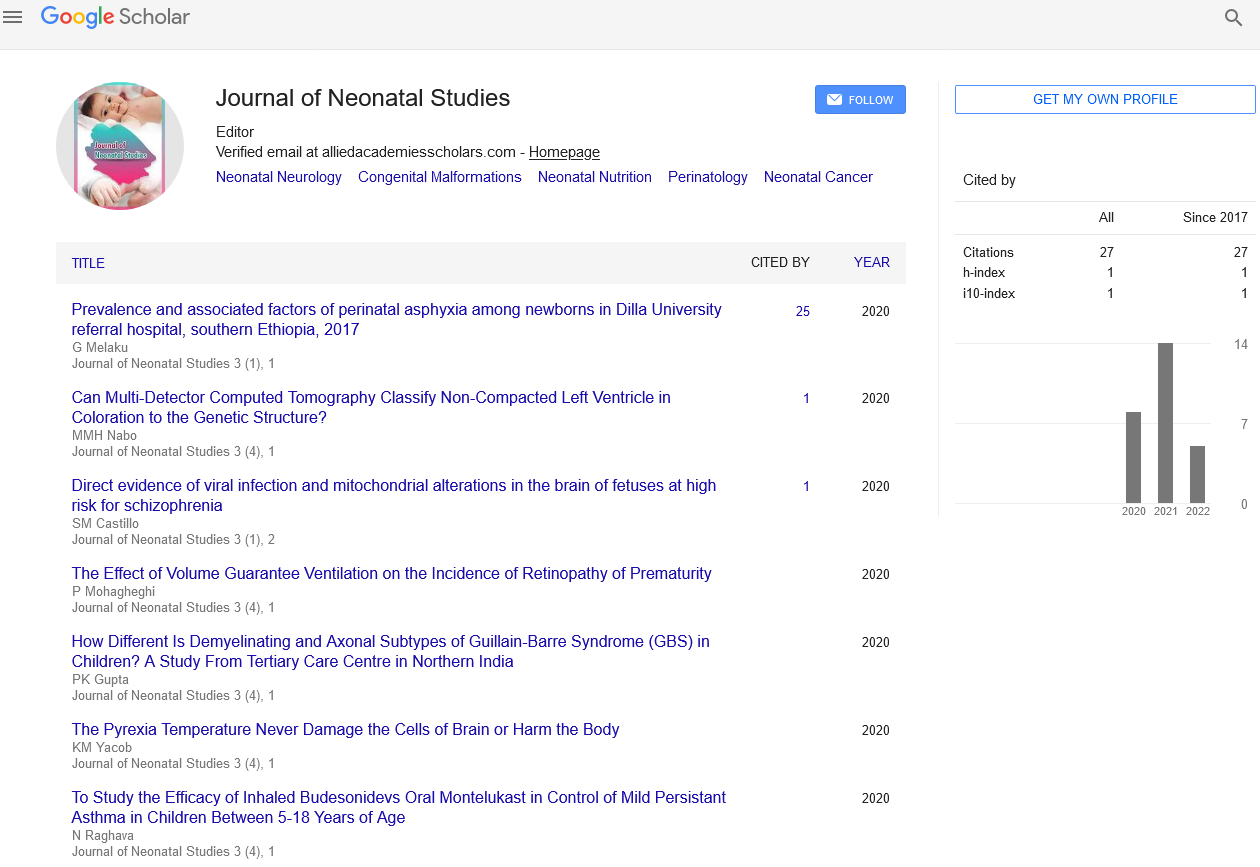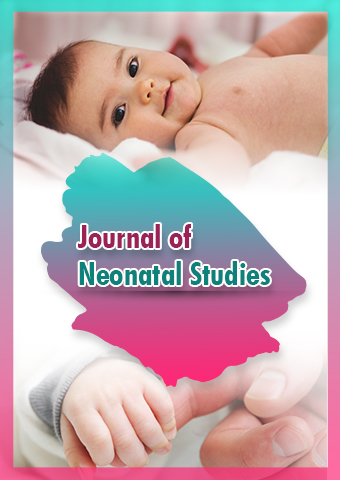Perspective - Journal of Neonatal Studies (2023) Volume 6, Issue 6
Nurturing Health: Understanding Maternal Obesity and Implementing Comprehensive Treatment Strategies for a Healthy Pregnancy
- Corresponding Author:
- Hirosuke Afonso
Department of Food Science and Nutrition, Kyoto University, Kyoto, Japan
E-mail: hirosuke.81@afon
Received: 10-Nov-2023, Manuscript No. JNS-23-121514; Editor assigned: 13-Nov-2023, PreQC No. JNS-23-121514 (PQ); Reviewed: 27-Nov-2023, QC No. JNS-23-121514; Revised: 08-Dec-2023, Manuscript No. JNS-23-121514 (R); Published: 18-Dec-2023, DOI: 10.37532/JNS.2023.6(6).161-163
Introduction
Maternal obesity refers to a condition in which a woman has an excessive amount of body fat before or during pregnancy. It is a growing public health concern worldwide and has implications for both maternal and child health.
Description
Here are key aspects to consider when discussing maternal obesity
Prevalence and trends
Global issue: Maternal obesity has become a global health challenge, affecting women in both developed and developing countries.
Increasing rates: Over the past few decades, there has been a significant increase in the prevalence of maternal obesity, attributed to lifestyle changes, dietary habits, and sedentary behaviors.
Causes and risk factors
Poor diet and sedentary lifestyle: Consuming a high-calorie, low-nutrient diet and engaging in insufficient physical activity are major contributors to maternal obesity.
Genetic factors: Genetic predisposition can play a role in an individual’s susceptibility to obesity. Socioeconomic factors: Women in lower socioeconomic groups may face challenges accessing healthy food options and engaging in physical activity.
Impact on maternal health
Gestational diabetes: Maternal obesity increases the risk of gestational diabetes, a condition that affects blood sugar levels during pregnancy.
Hypertension and preeclampsia: Obesity is associated with higher rates of hypertensive disorders during pregnancy, including preeclampsia, which can have serious implications for both the mother and the baby.
Labor and delivery complications: Maternal obesity is linked to an increased likelihood of labor induction, cesarean section deliveries, and difficulties in monitoring during labor.
Impact on fetal and child health
Birth defects: There is an elevated risk of certain birth defects, including neural tube defects and congenital heart defects, in babies born to obese mothers.
Macrosomia: Maternal obesity is associated with an increased likelihood of delivering large babies, a condition known as macrosomia, which can lead to birth complications.
Childhood obesity: Children born to obese mothers may have a higher risk of developing obesity and related health issues later in life.
Interventions and management
Preconception care: Encouraging healthy lifestyle choices before conception can help address maternal obesity and improve overall pregnancy outcomes.
Nutritional counseling: Providing guidance on healthy eating habits and appropriate weight gain during pregnancy is essential.
Physical activity: Encouraging safe and regular physical activity during pregnancy can help manage weight and reduce the risk of complications.
Multidisciplinary care: Collaboration among healthcare professionals, including obstetricians, dietitians, and other specialists, is crucial for comprehensive care.
Public health strategies
Education and awareness: Public health campaigns can raise awareness about the risks of maternal obesity and promote healthy lifestyle choices.
Community support: Creating supportive environments that facilitate access to nutritious foods and opportunities for physical activity can contribute to healthier pregnancies.
Research and policy
Ongoing research: Continued research is needed to better understand the complex factors contributing to maternal obesity and to develop effective interventions.
Policy initiatives: Government policies promoting healthier environments, such as improved food labeling and increased access to nutritional education, can play a role in addressing maternal obesity.
Treatment
The treatment for maternal obesity involves a comprehensive, multidisciplinary approach aimed at promoting a healthy lifestyle, managing weight gain, and addressing potential complications. Here are key components of the treatment for maternal obesity.
Preconception care
Encouraging women to achieve a healthy weight before conception is crucial. Preconception care involves addressing nutritional needs, optimizing physical activity, and managing any underlying health conditions.
Nutritional counseling
Nutritional guidance is a cornerstone of treating maternal obesity. A registered dietitian can help develop a personalized meal plan that meets the nutritional needs of the mother and supports a healthy weight. Emphasis is placed on a balanced diet with appropriate calorie intake.
Physical activity
Incorporating regular and safe physical activity is essential for managing maternal obesity. Healthcare providers can recommend suitable exercise routines that align with the woman’s fitness level and pregnancy status.
Behavioral interventions
Behavioral interventions focus on modifying habits and promoting positive lifestyle changes. This may include strategies to address emotional eating, stress management, and developing sustainable habits for long-term health.
Monitoring weight gain
Healthcare providers monitor maternal weight gain throughout pregnancy and provide guidance on appropriate weight management. Striking a balance between ensuring adequate nutrition for the growing baby and managing weight gain is essential.
Medical management
In some cases, healthcare providers may consider medical management under close supervision. This might involve medications to address obesity-related conditions, always with careful consideration of potential effects on the pregnancy.
Support groups and counseling
Emotional and psychological support is crucial for women with maternal obesity. Joining support groups or seeking counseling can provide a supportive environment to address the emotional aspects of weight management.
Prenatal education
Providing education about the potential risks associated with maternal obesity and the importance of adhering to recommended lifestyle changes is essential. This empowers women to make informed decisions for their health and the health of their baby.
Postpartum support
Treatment extends into the postpartum period, focusing on weight management, breastfeeding support, and maintaining a healthy lifestyle. Postpartum care is critical for long-term maternal health.
Multidisciplinary care
Collaborative care involving obstetricians, nutritionists, physical therapists, and mental health professionals ensures a holistic approach to maternal obesity treatment.
Public health initiatives
Government and community-level initiatives can play a role in preventing and treating maternal obesity. These may include educational campaigns, improved access to healthy foods, and the creation of environments that support physical activity.
Research and policy advocacy
Ongoing research is crucial for developing evidence-based interventions. Advocacy for policies that promote healthier environments, such as improved nutrition labeling and increased access to healthful foods, contributes to broader systemic change.
The treatment for maternal obesity is not a one-size-fits-all approach and should be tailored to individual needs. The goal is to support women in achieving and maintaining a healthy weight before, during, and after pregnancy, promoting positive maternal and fetal outcomes.
Conclusion
In conclusion, maternal obesity is a multifaceted issue with far-reaching implications for both mothers and their children. Comprehensive approaches that involve education, support, and policy changes are essential for addressing and preventing maternal obesity and improving the health outcomes of both mothers and infants.

